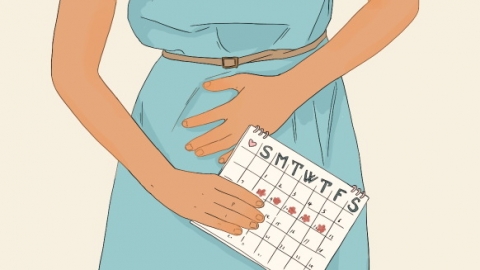How to regulate delayed menstruation
Generally, delayed menstruation may be caused by irregular作息 (作息 translates to rest/activity patterns), emotional fluctuations, polycystic ovary syndrome, hypothyroidism, premature ovarian failure, and other factors. It is recommended to seek timely medical consultation to identify the underlying cause and improve the condition under a doctor's guidance through general lifestyle adjustments, medication, and other methods. A detailed analysis is as follows:

1. Irregular作息: Long-term熬夜 (熬夜 translates to staying up late), and disrupted sleep-wake cycles can affect the hypothalamic-pituitary-ovarian axis function, leading to abnormal hormone secretion and delayed menstruation. It is important to adjust作息, sleep at a fixed time daily, ensure 7-8 hours of sleep, avoid熬夜, and allow hormone levels to gradually stabilize.
2. Emotional fluctuations: Prolonged anxiety, depression, or sudden emotional stress can interfere with the endocrine system, causing menstrual cycle disorders. Emotions can be relieved through exercise, meditation, communication with others, and maintaining a cheerful mood to reduce the impact of emotions on the endocrine system.
3. Polycystic ovary syndrome: Endocrine disorders lead to abnormal ovulation, manifesting as delayed menstruation and hirsutism. Patients should follow medical advice to use medications such as ethinyl estradiol cyproterone tablets, drospirenone ethinyl estradiol tablets, and desogestrel ethinyl estradiol tablets to regulate hormones.
4. Hypothyroidism: Insufficient secretion of thyroid hormones slows down body metabolism and affects ovarian function, leading to delayed menstruation and reduced menstrual flow. Patients should follow medical advice to use medications such as levothyroxine sodium tablets, thyroid tablets, and l-thyroxine tablets to supplement thyroid hormones.
5. Premature ovarian failure: Premature decline in ovarian function leads to reduced estrogen secretion, causing abnormal ovulation or anovulation, which may result in delayed menstruation or amenorrhea. Patients should follow medical advice to use medications such as estradiol valerate tablets, conjugated estrogens tablets, and nylestriol tablets to supplement estrogen and maintain hormonal balance.
In daily life, maintain a regular diet, avoid excessive dieting or overeating, eat more nutrient-rich foods such as soy products, lean meat, fresh fruits, and vegetables; engage in moderate physical activities such as brisk walking and yoga to promote blood circulation and regulate the endocrine system; keep warm, avoid cold exposure to the abdomen, and assist in improving delayed menstruation.




